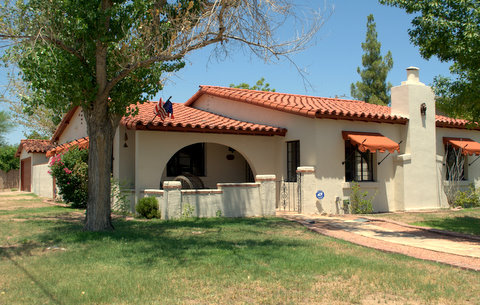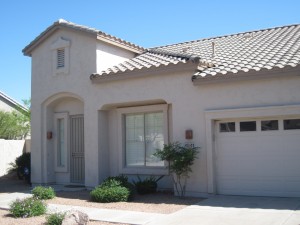by Paul Slaybaugh | Feb 21, 2024 | Home Buying
Is it a good time to buy a house?
If I had a donut for every time I have been asked this question over the past quarter century, my whole family tree would have diabetes.
In the pantheon of real estate inquiries, it remains unrivaled. All other frequently asked questions flow from its headwaters. You never get to is this a good area, or how are the schools without first fielding the pre-requisite question that begets all others.
No one cares about the specifics until satisfied that buying a home at this (or any) particular time is a good idea in general.
Over the years, I’ve had different responses to that question based on current market forces, prognostications, etc. Sometimes it’s a no-brainer, like when the foreclosure and short sale market started to clear out on the back side of the great recession of the late aughts. It didn’t take much foresight to realize that prices had reached a nadir and were about to slingshot the other way.
Indeed, over a decade of value gains catapulted those fortuitous buyers to equity piggy banks larger than even the most optimistic predictions could have anticipated.
Similarly, there were clear signs in 2005-2006 that an impossibly hot market was bound to cool. Once again, it wasn’t too challenging to see a slowdown and potential value dip looming, even if the full scope of the crash was far beyond what anyone saw coming.
Beyond those times where there are bright flashing warning signs, however, what I have learned more than anything in this business is that the prognostication game is a fool’s errand. Things change too rapidly, and factors too numerous to account for and predict tend to upend forecast models with alarming regularity.
I have been expecting a dip in values since about 2018, convinced that price points have become unsustainable, particularly for entry level buyers. No entry level buyers means no move up buyers. And so on and so forth. It seemed the inexorable march of rising prices was fueled by artificially low interest rates. As soon as rates crept up in response to inflation, I just knew values would suffer as a result.
And I was dead wrong.
Sure, the market cooled when rates first shot up, and prices did see a modest dip. Not nearly as sharp of a decline as I expected, however, and it came much later than I expected.
If you listened to me and sold in 2019, you likely lost out on some additional gain. If you purchased despite my warnings, you realized additional gain.
Why didn’t it go the way I expected? Because homeowners that locked in 2.5 – 3% interest rates in the last five years are now refusing to move.
Why would they?
Those who would like to sell to upsize, downsize, move out of state, or whatever, will have to move somewhere. If they require financing to make the move, as many do, they can look forward to an interest rate that is, at minimum, double their current one.
Kinda kills the vibe.
Fewer sellers, means fewer options for today’s buyers. High demand and low supply has kept home prices high, despite affordability concerns.
The point being that the market is always as likely to zig as it is to zag, because the thing you think is gonna be the thing, turns out not to be the thing at all.
So when people come to me today, in 2024, asking if it’s a good time to buy, what do I tell them?
I answer the question with two of my own:
- Are you financially able to purchase a house?
- Does the security of being a homeowner outweigh the freedom from attachment that renting offers?
If you answer ‘yes’ to both of these questions, it’s a good time to buy a house. If you answer ‘no’ to either of them, it’s not.
Stop listening to the talking heads with red faces and halitosis who shout their investment/financial strategies at you via cable TV. They don’t know you or your goals. If they want to watch the price of yak milk in southern Sri Lanka to determine whether the Swiss Franc will hold up to the deflationary pressure in the Argentinian gold bullion market, thus spiking land values in the least of the Lesser Antilles, creating a flood of American ex-pat migration, leading to a glut in the US housing supply that crashes the national median sales price by $5000, let them. Doesn’t mean you need to join them on that hamster wheel.
Need a house?
Can you afford to buy one?
Want to put some roots down?
Great.
It’s a good time to buy.

by Paul Slaybaugh | Jan 23, 2020 | Home Buying, Home Selling, Scottsdale Real Estate
The year was 2005. The market was hot. White hot. Jump up and down, and yell I’m a pony! hot. Everyone within the city limits of Scottsdale AZ had or was in the process of obtaining their Real Estate license. By July, I had lost former clients to chiropractors, dentists, doctors, doctors’ spouses, doctors’ spouses’ doctors … I thought I had experienced it all. Mind you, the prevailing thought at the time was that a chimpanzee with a business card could sell a house. And he probably could have with a Multiple Offer Addendum and a cell phone, but I digress. One day while running my daily search of the new inventory in McCormick Ranch, I see a suspiciously familiar address. I pull up the listing and do the whole Is that …? No, can’t be. But it looks …? NOOOO!!! bit.
Sure enough, it was the lovely couple I had sold the home to a few years back and had only recently visited over the holidays. My mind raced.
What did I do wrong? Are they upset with me? Did I fail to keep in touch? Did I keep in touch too much? Is it because I mangled their son’s name that time we ran into each other at the coffee shop?
After letting my stomach churn over the myriad ways I could have potentially brought this upon myself, I finally picked up the phone. After two rings, a familiar voice answered. Mindful to make sure that I did not say anything that could be construed as tampering with another agent’s listing, I simply blurted out, “What happened?”
Long story short: The wife’s hairdresser had recently gotten her Real Estate license to use on the side. Now, in my opinion, the words “hairdresser” and “Realtor” should never collide in the same sentence, but apparently not everyone agrees. No one would ever in a million years sit down at a chair and let me go to town with a pair of clippers and #2 attachment, but my highly educated clients made the decision to help her out by listing a $500,000 asset for sale and purchasing a million dollar property with her.
Now, I will not pretend that I did not first take the news personally and selfishly. That is a big chunk of business to lose to a hobbyist, and it stung. The value proposition of hiring a full-time, active agent did not outweigh the desire to help a friend get started in the industry. That is not an easy pill to swallow. What’s worse and ultimately paramount, however, is the disservice such a choice can do to the consumer him or herself. When you don’t engage in the practice of selling Real Estate but once or twice a year, if it all, you put the people you represent at an immediate disadvantage. You simply don’t know what you don’t know.
And sadly, in this case, my former clients … ultimately got a bad haircut.
It serves as a reminder that it doesn’t go without saying to the general public that all agents are not interchangeable. The effect of the misconception that we are can have a monumental effect on your bottom line and long-term satisfaction. As such, I try to use such experiences as teachable moments.
Remember, folks. We all want to help our friends and family members when and where we can, but think carefully before employing someone to guide you through a home sale or purchase if it is just their “side hustle.” This is not a profession that requires an advanced degree or special skill set over and above modest intelligence, tenacity, and a willingness to leverage your knowledge and experience for the benefit of your clients, but it does require practice. Experience. Repetition. Like any other human endeavor performed exceptionally, if never perfectly.
I don’t begrudge anyone the opportunity to make a little extra money in their spare time, but I firmly believe there is value to hiring someone who is working in their primary field of expertise. Hire your neighbor’s kid to pull your weeds. Hire your nephew’s girlfriend to walk your dog.
But when you have a major service need, I would advise the following:
- Need roof work done? Hire a roofer.
- Need your transmission serviced? Hire a mechanic.
- Need a haircut? Hire a barber.
- Need to buy or sell a home? Hire a Realtor.
And not a moonlighter. An active, full-time Real Estate professional who has been there, done that, and won the cheesy t-shirt in a home tour group raffle.
After all, if you don’t want me fixing your fade after spending my evenings learning the craft via YouTube, you probably don’t want your hair stylist selling your house.
Paul has been selling the greater Phoenix area as a full-time Realtor for over 20 years now. For all of your Scottsdale AZ Real Estate needs, please visit him at www.scottsdalepropertyshop.com
by Paul Slaybaugh | Jan 3, 2018 | Home Buying, Phoenix Neighborhoods, Phoenix Real Estate

What? You didn’t think we never left the cozy confines of Scottsdale, did you?
Don’t let the self-typecasting branding of this website fool you. We serve the entire metro Phoenix area. We have a particular affinity for the historic homes of downtown Phoenix. Here are the very latest historic home listings sorted by district.
Scroll to peruse live feeds for the latest homes for sale in the Phoenix Historic District of your choice (sorted alphabetically by district name). Click on district links to view all historic homes for sale.
Alvarado / East Alvarado Historic District Homes
________________________________________________________
Ashland Place Historic District Homes
________________________________________________________
Brentwood Historic District Homes
________________________________________________________
Campus Vista Historic District Homes
________________________________________________________
Cheery Lynn Historic District Homes
________________________________________________________
Coronado Historic District Homes
________________________________________________________
Country Club Park Historic District Homes
________________________________________________________
Del Norte Place Historic District Homes
________________________________________________________
Earll Place Historic Homes
________________________________________________________
East Evergreen Historic District Homes
________________________________________________________
Encanto-Palmcroft Historic District Homes
________________________________________________________
Encanto Manor / Encanto Vista / North Encanto Historic District Homes
________________________________________________________
Fairview Place Historic District Homes
________________________________________________________
F.Q. Story District Homes
________________________________________________________
Garfield / North Garfield Historic District Homes
________________________________________________________
Idylwilde Historic District Homes
________________________________________________________
La Hacienda Historic District Homes
________________________________________________________
Los Olivos Historic District Homes
________________________________________________________
Margarita Place Historic District Homes
________________________________________________________
Medlock Place Historic District Homes
________________________________________________________
Oakland Historic District Homes
________________________________________________________
Phoenix Homesteads Historic District Homes
________________________________________________________
Pierson Place Historic District Homes
________________________________________________________
Roosevelt / Roosevelt Park Historic District Homes
________________________________________________________
Villa Verde Historic District Homes
________________________________________________________
Willo Historic District Homes
________________________________________________________
Windsor Square Historic District Homes
________________________________________________________
Woodland Historic District Homes
________________________________________________________
Woodlea Historic District Homes
________________________________________________________
Yaple Park Historic District Homes

by Paul Slaybaugh | Dec 20, 2014 | Home Buying
Greetings, Winter Visitors!
On behalf of the fine city of Scottsdale, I’d like to welcome you to the land of short sleeves and flip flops. Whether you are visiting us for the first time or have been making the annual pilgrimage for many years now, you are warmly welcomed. Literally.
There is no shortage of activities and attractions to enjoy during your stay. If I may be so bold as to offer a few suggestions, follow this link to read up on stuff to do in Scottsdale from a local’s perspective.
Now, if you are like me, you can’t help but toy with the idea of a second home purchase during the course of virtually every vacation you take. While those whims often fall by the wayside shortly upon returning home, they can make a lot of sense in Scottsdale’s case. I can only imagine how much you are spending per night in one of our five star resorts or furnished vacation rentals. If you plan on making an annual reprieve from the ice and snow a semi-normal thing, buying your own spot can be much more appealing than paying the hefty hotel tabs.
You can afford to stay longer, rent the place out when it’s not in use, and you get to sleep in your own bed.
Enough with the sales pitch, though. You wouldn’t have landed on this page if you weren’t already trolling vacation homes online. So without further ado, here are a few listing feeds created specifically with you in mind.
Low maintenance patio homes, gated condo / townhouse communities, homes near Old Town Scottsdale, homes near shopping centers, golf community homes, homes near attractions like Westworld and the Ice Den … it’s all just a bit further down the page.
See one you like? Call me and I’ll show it to you in five minutes. Okay, it might take slightly longer than that to set it up, but there is a message behind the hyperbole. I get very little rest during the high season. On call virtually 24/7 from January to May, I am here to help turn your pipe dream into reality.
Patio Homes
Townhouses
Condos
Golf Communities
Old Town Scottsdale Homes
Homes Near Shopping Centers
Homes Near Salt River Fields
Homes Near Westworld
Homes Near the Ice Den
Not seeing what you’re looking for? Create your own custom home search here!
by Paul Slaybaugh | Dec 18, 2014 | Home Buying
 “Alright, alright. Mickey’s a mouse, Donald’s a duck, Pluto’s a dog. What’s Goofy?”
“Alright, alright. Mickey’s a mouse, Donald’s a duck, Pluto’s a dog. What’s Goofy?”
– Gordie, Stand By Me
Patio homes: what are they?
If you have been in Scottsdale for any period of time, or have been shopping for a home from afar, you have undoubtedly encountered the term patio home more than once.
You know what a single-family home is. You know what a condo is. You even know what a townhouse is.
But what the hell is Goofy?
The term, patio home, is not a legal descriptor. It does not describe a style of ownership. It is really more of an idea than a legal thing.
For brevity’s sake, we’ll define a patio here in accordance with prevailing wisdom. Most consider a patio home to be a cross between a townhouse and a single-family home; a hybrid, if you will. Patio homes bridge the divide between traditional housing types. You can think of a patio home like a single-family home that has been plopped onto a townhouse sized lot. That’s a gross oversimplification, of course, as patio homes come in all shapes and sizes, but this post is to serve as a handy crib sheet, not a thesis.
The idea is to provide housing with relatively low outdoor maintenance without sacrificing the size of the home itself. In other words, patio homes are tailored to those who still want the privacy and comforts of a single-family home, just not all of the headaches and expenses that come with the standard single-family lot.
The typical patio home may be attached to a neighboring property by one or two common adjoining walls (like most townhouses), or be free-standing (like most single-family homes). Many patio homes are single level, but they can have multiple levels, too. Patio homes typically do not have neighbors above or below them, as is common with apartment style condos.
Patio home ownership varies from development to development. Some entail fee simple ownership (you own the lot in addition to the structure). Some entail condo ownership (you do not own the lot, just a fractional interest in the common area).
Responsibility for property maintenance varies as well. Some communities have very active homeowner associations that provide for front landscaping maintenance as well as select exterior structural maintenance of the homes themselves. Other patio home communities more closely reflect single-family ownership, in which homeowners are fully responsible for all maintenance associated with their properties. You need to check community CCRs to determine exactly what is and what is not covered by the HOA in a patio home development.
If you like the idea of a smaller, low-maintenance lot, but aren’t quite ready to step all the way down to a townhouse or condo, a patio home might be just the thing for you. Popular with seasonal residents as well as full-time residents who frequently travel or simply prefer a little less upkeep, patio homes exemplify the lock-and-leave lifestyle that many Scottsdale home buyers seek.
So there you go. Not so Goofy after all, is it?
Ready to start your Scottsdale patio home search? Follow the new listing feed below for the very latest active listings, updated daily!
by Paul Slaybaugh | Dec 14, 2014 | Home Buying, Scottsdale Real Estate
Earnest money.
You’ve heard about it, been asked for it; you may have even written a check for it. What exactly is earnest money, though, and why do you need it when you buy a house?
Earnest Money FAQ

When buying (or leasing) a home in Scottsdale, you will be asked to put up a good faith deposit to secure your position in the transaction. This consideration is known as an earnest deposit.
Earnest deposit amounts are negotiable. The amount of the deposit is one of the terms of the purchase agreement over which buyers and sellers may haggle. In my experience, a typical earnest deposit on a resale transaction is approximately 1-2% of the total sales price. Builders may require higher deposit amounts for brand new construction (largely due to the costs incurred to build your home). Banks may also require more on REO/foreclosure properties (because they are the spawn of Satan).
If you are following the standard boilerplate terms of the current AAR (Arizona Association of Realtors) purchase agreement, your earnest deposit is due upon the agreement being accepted and signed by all parties.
In nearly all cases, your earnest funds will be held by an escrow company, the neutral third party responsible for transferring ownership from the seller to the buyer. The company employed to hold these funds is another term of the purchase agreement that you negotiate with the seller. Earnest money can also be held in the trust account of one of the Real Estate brokers involved in the transaction, but this eventuality is primarily restricted to the rental arena these days. If you are buying a house, you can pretty much take it to the bank that you will be dealing with an escrow company.
- Is This Extra Money That I Have to Pay in Addition to My Down Payment and Closing Costs?
This is a common misconception. The answer is no, this is not “extra money” that you are being charged. It is a portion of your total closing funds that is simply due up front. Upon closing, your earnest deposit will be applied towards your down payment and/or closing fees.
Typically, a personal check made payable to the chosen escrow company will suffice, though some opt to wire funds to the escrow company instead.
- Can I Get My Earnest Deposit Back?
This is a loaded question, but yes, there are scenarios in which you can typically retrieve your earnest deposit. Assuming you negotiated the sale using the current AAR purchase agreement, you do have a few outs. First, you have an inspection period (usually 10 days, but negotiable). If you are not satisfied with the condition of the property, or the seller refuses your repair demands, you can withdraw from the transaction and have your earnest money refunded. Of course, this presumes that you have not agreed to any changes in the standard terms of the contract (such as purchasing “as is”, agreeing to non-refundable earnest money, etc).
Under the standard provisions of the contract, you can also get your earnest money back if your loan is declined (after your diligent effort to obtain one under the stated terms) or the home doesn’t appraise for the purchase price (unless you are paying cash as there is no appraisal/financing contingencies to fall back on). Once again, though, and I can’t stress this enough, the terms you negotiate with the seller can alter these provisions.
- What If My Deposit Turns Out to Be More Than I Owe at Closing?
Let’s say that you are employing a 100% financing vehicle, like a VA loan. Let’s also say the seller has agreed to pay for the majority of your closing costs. If the remaining costs owed by you at closing are exceeded by your initial earnest deposit, you are entitled to a refund of the excess deposit.
- Can I Lose My Earnest Deposit
Yes, you most certainly can forfeit your earnest deposit. As the purpose of this deposit is to demonstrate good faith to the seller and invest you in the successful completion of the transaction, your deposit can be forfeited to the seller as damages if you breach the agreement. Failure to close escrow, or backing out of the deal for any reason other than allowed for by a contingency to the agreement, is a surefire way to kiss your deposit goodbye. In the event that you wish to cancel a transaction, be sure to carefully review the terms of your contract with an attorney.
- Who Decides If the Buyer or Seller Gets the Earnest Money if There is a Dispute?
The escrow company that holds the deposit is charged with interpreting the terms of the contract, and has the authority to release the deposit to the party deemed NOT to be in breach of the agreement. Say you, as the buyer, decide that you aren’t comfortable with the neighborhood’s governing covenant’s, codes and restrictions (CCRs). You inform the escrow company (in writing) of your wish to cancel the transaction. The seller objects, claiming that you did not exercise your right to cancel in a timely fashion. You had 5 days from the receipt of those documents to withdraw from the purchase contract, but did not inform the escrow company of your intentions until day 7. Therefore, the escrow company decides in the seller’s favor, and releases the earnest money to him/her as liquidated damages for your breach of the agreement.
Have any additional questions regarding the role of earnest money in a Real Estate transaction? Ask away in the comment section below (or shoot me a private message if you prefer) and I will do my best to address them.
Disclaimer
* It should go without saying that the above is not intended as legal advice. The general explanations may not directly apply to you. As every purchase contract is unique, the internet is not a reliable source for answers to questions regarding your specific agreement. Consult with your agent and/or attorney PRIOR to the execution of your purchase contract to fully understand the terms and protections afforded you.




 “Alright, alright. Mickey’s a mouse, Donald’s a duck, Pluto’s a dog. What’s Goofy?”
“Alright, alright. Mickey’s a mouse, Donald’s a duck, Pluto’s a dog. What’s Goofy?”
